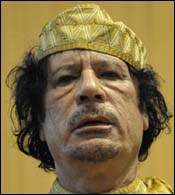 A thoughtful article from the McClatchey News Service explains why no matter how attractive it may seem now to impose economic sanctions on Libya, that is something easier said than done. Administration aides in Washington told McClatchey that even though Obama has so far not called directly for sanctions against Libya, the White House would seek such sanctions in cooperation with international partners.
A thoughtful article from the McClatchey News Service explains why no matter how attractive it may seem now to impose economic sanctions on Libya, that is something easier said than done. Administration aides in Washington told McClatchey that even though Obama has so far not called directly for sanctions against Libya, the White House would seek such sanctions in cooperation with international partners.
The first complication, of course, is that the United States does not want to jeopardize the safety of the many Americans that remain trapped in Libya. Although many U.S. citizens have been able to leave on a State Department chartered ferry from Tripoli to Malta, many more U.S. citizens who are working on oil fields are stranded in remote locations. A second problem with sanctions is that, to the extent they try to cut off sales of Libyan oil, they will have a detrimental impact on U.S. consumers by increasing the price of oil. Third, unilateral U.S. sanctions would have little impact on Libya because there is very little trade between the U.S. and Libya. Those are all fair points.
Libya is already subject to an arms embargo under section 126.1 of the International Traffic in Arms Regulations. Exceptions to the embargo are made for non-lethal defense articles and safety-of-use items, such as technical manuals and ejection seats for military aircraft, as parts for lethal defense articles. The use of military aircraft against the civilian population of Libya could serve as a justification for the elimination of these exceptions, but there is no indication that this is currently being contemplated.
 Permalink
Permalink
Copyright © 2011 Clif Burns. All Rights Reserved.
(No republication, syndication or use permitted without my consent.)

 Posted by
Posted by  Category:
Category: 

